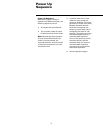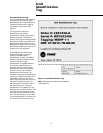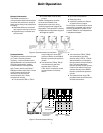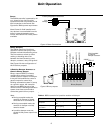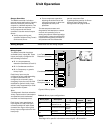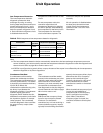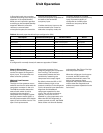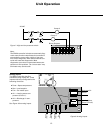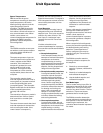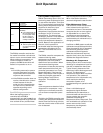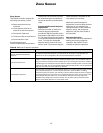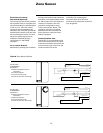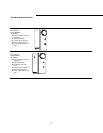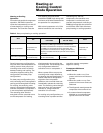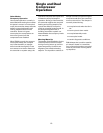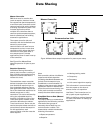
13
Unit Operation
Space Temperature
ZN510 controls the space
temperature according to the active
space temperature, the active
heating/cooling setpoint, and the
space temperature control
algorithm. The ZN510 controller
receives the space temperature
from either a wired zone sensor or
as a communicated value. When
neither a zone sensor nor
communicated space temperature is
present, the ZN510 controller
generates a space temperature
failure diagnostic.
Note:
The ZN510 controller cannot oper-
ate without a valid space tempera-
ture value (either hardwired or
communicated).
The space temperature input can
communicate timed override
ON or
CANCEL requests to the ZN510
controller. If the ON button is
temporarily pressed, the zone
sensor sends a signal to the
controller. This signal is then
interpreted as a timer override
request which places the unit into
occupied.
The controller uses the timed
override request (while the zone is
unoccupied) as a request to switch
to the Occupied Bypass mode
(occupied bypass). This Occupied
Bypass mode lasts for the duration
of the occupied bypass time,
typically 120 minutes.
or
The controller’s Occupancy mode is
determined from either a system
level controller or another peer
controller.
The
CANCEL button cancels the timed
override request and returned the
unit to unoccupied mode. If the
CANCEL button is temporarily
pressed, the zone sensor sends a
signal to the controller. This signal is
then interpreted as a timed override
cancel which places the unit into
unoccupied.
Local Setpoint
The local setpoint analog input is
designed as the local (hardwired)
setpoint input. This input cannot be
used for any other function. The
local input is a resistance input
intended for use with Trane zone
sensors.
If neither a hardwired nor
communicated setpoint is present,
the controller uses the stored default
setpoints:
z Occupied setpoints:
In the occupied mode, the unit
attempts to maintain the space
temperature at the active
occupied heating or cooling
setpoint based on the measured
space temperature, the active
setpoint, and the proportional/
integral control algorithm.
z Occupied standby setpoints:
In occupied standby mode, the
controller uses the occupied
standby cooling and heating
setpoints. Because the occupied
standby setpoints typically
cover a wider range than the
occupied setpoints, the ZN510
controller reduces the demand
for heating and cooling the
space. Also, the outdoor air
damper is normally closed
during occupied standby mode
to further reduce the heating
and cooling demands.
z Unoccupied setpoints:
In unoccupied mode, the unit
attempts to maintain the space
temperature at the stored unoc-
cupied heating or cooling
setpoint based on the measured
space temperature, the active
setpoint, and the proportional/
integral control algorithm,
regardless of the presence of a
hardwired or communicated
setpoint.
Once a valid setpoint is established
(through the hardwired input or
through communication) and when
neither a local setpoint or
communicated setpoint is present,
the controller generates a setpoint
failure diagnostic.
When a setpoint failure diagnostic
occurs, the controller operates using
the default heating and cooling
setpoints. These setpoints are
factory-configured, but may be
changed using the Trane service
tool, Rover.
The ZN510 controller uses the
following validation sequence for
the setpoints:
1. Check for a communicated
setpoint. If present, validate this
setpoint.
2. Check for a hardwired setpoint
and validate the setpoint.
3. Use the default setpoint and
validate this setpoint.
Fan Mode Input
The fan mode analog input (Fan) is
designed to operate as the fan mode
switch input. This input cannot be
used for any other function. The fan
switch on a Trane zone sensor
generates the fan mode signal.
The ZN510 controller detects the
unique resistance corresponding to
each position of the fan switch. By
measuring the resistance, the
controller determines the requested
fan mode.



